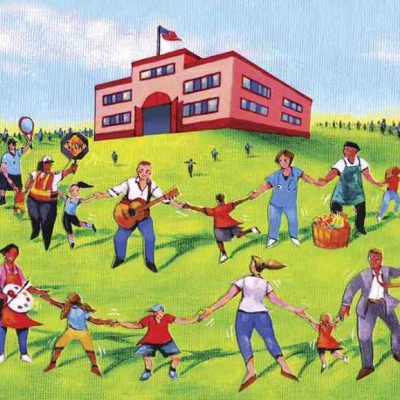The key to human success is language.
Has someone ever said something to you that changed how you thought about them, yourself, a specific topic, or even the world at large? Maybe it was a tidbit of good advice that now follows you in your day to day or a scathing remark that still stings when you think about it. Whatever it was, consider how these interactions stuck with you–specifically, the words that were said.
Language has far more power than we give it credit for. While you may not consider it regularly, or at all, words and language are humanity’s most potent and valuable tools. However, like any tool, they can be used with a variety of intents and purposes. Our most notable traits as a species are a high level of interdependence and a precise means of communication, which have ultimately led us to flourish as the dominant species on Earth. Humans have evolved so that words hold an immense influence over our physical, mental, and emotional wellbeing, which is key to understanding how our brains work independently and cooperatively. This ability to communicate concisely has been the key to human success over all other organisms and has allowed us to make huge advancements in technology, the arts, government, and more.
The first step to understanding the impact of verbal communication is the recently substantialized theory that words have inherent meanings. While having a positive or negative experience related to specific words can influence one’s perception of them, some linguistic scientists have argued convincingly that humans have relatively constant perceptions of certain words and phonetic sounds. An article on Dictionary.com titled, “Was Saussure wrong?” outlines this idea, called “naturalism.” In the past, the general agreement of linguists surrounded the theory of conventionalism, which argues that the connection between words and what they are meant to signify or express is random and meaningless, a belief pioneered by famous linguist Ferdinand de Saussure. This article however contradicts Saussure’s claims, citing a popular study that was performed in order to gauge whether people connect certain phonetic sounds to shapes.
Participants were presented with two shapes, one with sharp edges and another with rounded edges, and were asked to determine which one should be named Kiki and which should be named Bouba. In the article, it states, “If you called the rounded shape ‘Bouba’ and the spiky shape, ‘Kiki,’ then you can count yourself among the vast majority. [The scientists] tested English, French and Tamil speakers and 95 to 98 percent had the same associations. The results of this study represent the first scientific retort to Saussure’s hypothesis of the arbitrary relationship between the signified and the signifier” (Dictionary.com 2013). Despite what has been widely accepted for quite some time, this experiment appears to show that there is at least some natural correlation in the human brain between spoken sounds (and by extension words), and what they are meant to represent.
The correlation displayed here shows the importance of verbal communication as a uniquely human tool that has led to our dominance as a species. Having specific perceptions of certain sounds and words promotes a common unity and understanding across language barriers. Our innate connection between sounds and meanings may have contributed to our ability to understand other languages in the past, as well as hone our own. And, after all, s the most important tool one can have, not the one that builds up other tools?
Another example of the importance of words as tools is the immense effect they have on our physical and mental health, a prevalent factor in human interdependence. Phycologist Lisa Feldman Barrett explores this concept in her article, “People’s words and actions can actually shape your brain — a neuroscientist explains how”, which was published on Ideas.TED.com. Barett describes the impressive influence we can have on others simply based on small actions or body language, not even factoring in verbal communication. She says, “If you raise your voice or just your eyebrow, you can affect what goes on inside other people’s bodies, such as their heart rate or the chemicals carried in their bloodstream. If a loved one is in pain, you can lessen their suffering merely by holding their hand” (Barrett 2020).
Barrett escribes language and verbal intercommunication as the most crucial parts of interdependence. According to her we “regulate each other with our words”, and can cause tangible changes in each other on a physical level. This only serves to display the immense power that words can have, something that Barrett herself acknowledges. She states that, “Other people’s words have a direct effect on your brain activity and your bodily systems, and your words have that same effect on other people. Whether you intend that effect is irrelevant. It’s how we’re wired.” Barrett is explaining the difference between intention and perception, and how these two things don’t always line up. However, though we often have misunderstandings and arguments, humans have become quite adept at sharing intention within language. This is integral to our function as a species because the precision and specificity of human language is what gives us an advantage over all other organisms, and has allowed us to work together and advance in a way that is impossible for any other type of animal.
Barrett later claims that our interdependence as a species is both our greatest strength and also our most grievous weakness, a dangerous tool that must be wielded carefully. This idea is expressed with extreme clarity by the testimony of Harry Dunn, a Capitol police officer, which he gave after the Insurrection of January 6th, when a violent mob stormed the Capitol building to halt the counting of the electoral votes for the 2020 presidential election. Dunn’s interview with the New York Times describes the immense verbal and physical abuse many officers, mostly those of color, experienced. In the interview, it is stated, “One of our Capitol officers who defended us that day was a longtime veteran of our force. For several hours straight as the marauders punched and kicked and mauled and spit upon and hit officers with baseball bats and fire extinguishers, cursed the cops, and stormed our Capitol, he defended us. And he lived every minute of his oath of office. And afterwards, overwhelmed by emotion, he broke down in the Rotunda, and he cried for 15 minutes. And he shouted out, I got called an n-word 15 times today. And then he reported” (New York Times 12/28/21).
The raw, strangled nature of this response is possibly one of the most poignant displays of the double-edged sword that is language. Words have built our civilization, connected us across continents, and allowed us to conquer our planet, but they can just as easily destroy what they have made. Unless we acknowledge words as a tool, to be used for better or worse, we will ultimately face societal and personal destruction. Some of this will see this on a small scale, with relationships falling apart because of misunderstandings and ignorance of the keen power of language. On the other end of the spectrum, we will likely suffer destruction at the hands of manipulative leaders who twist the minds of those they are meant to protect. Examples of this are easily found in our world today, one being the leader of Russia, Vladimir Putin. He has used media manipulation and intentional speeches meant to mislead and exploit his people by convincing them that his invasion of Ukraine is justified. While many Russian citizens are aware of this manipulation and have publicly opposed the harm he causes, some are sure to have fallen prey to his exploitative use of words and media.
If words are treated flippantly, they are as dangerous as any other misused tool. However, if we harness the power that words have over the human species and strive to understand how they affect our interdependence as such, we can make unimaginable bounds in every field of study, relationship, and problem we hold as the human race. We can’t just have the precision of language, we require mastery over it to flourish and progress as a people.








